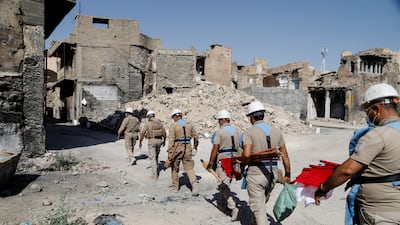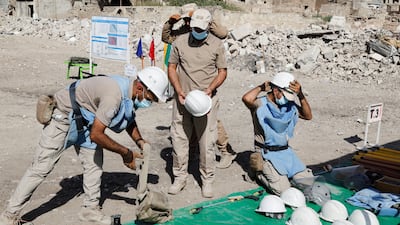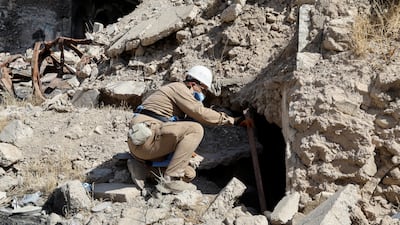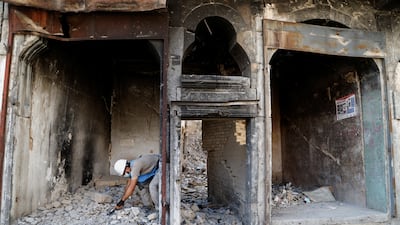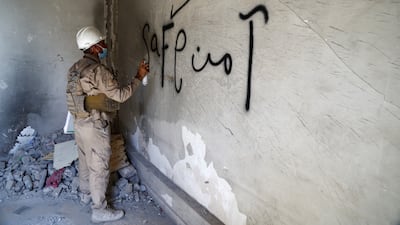Mosul is a noisy city.
Unlike other metropolises, it is not the sounds of daily commuters or planes soaring over head that fill the air, but the thrums and bangs of cranes knocking down unstable structures, bulldozers removing rubble and drill hammers reverberating across Iraq’s northern city.
Five years after it was retaken from ISIS in a battle that left much of it in ruins, construction in the capital of Nineveh province is continuing, albeit slowly.
For some, the reconstruction is bearing fruit.
Hadla Hussein Youssif, 80, sitting in the open courtyard of her house, the fragrance of a Eucalyptus tree wafting in the air, says her home in the Old City was recently reconstructed by the United Nations Development Programme (UNDP), which has spent hundreds of millions on the city.
“There is nothing left that they didn’t do,” she says of ISIS's efforts to destroy her home, but gestures at the newness of a nearby small garden where trees of fig, grape and lemon have been planted.
The peaceful calm of the scene is a small salve on the traumatic memories of the extremists' arrival.
The mother of 10 said her sons put her on their shoulders to flee the fighting after a rocket hit the house.
A thriving city turned to ashes
Mosul was the first city to fall into the hands of ISIS during their blitz in mid-2014. It was the crown jewel of the extremist group’s “caliphate” that was declared in large areas of Iraq and Syria.
In October 2016, Iraqi security forces backed by a US-led international coalition launched what was known as the world’s biggest urban battle since the Second World War.
They announced the end of combat operations in mid-2017. It took six more months to claw back surrounding areas and announce that ISIS was defeated across Iraq.
But the price of victory came with a grim toll: tens of thousands died, millions were displaced and entire towns and neighbourhoods were reduced to rubble.
“It’s a miracle that we survived,” Ms Youssif's son Faris Shaaban says, recalling how he narrowly missed being hit by a mortar round when he tried to get water from the nearby Tigris River.
“We went through indescribable circumstances with no food or water, people were boiling wheat to eat. It was a real famine. Adding to that [ISIS] tried to shoot and kill anyone fleeing,” Mr Shaaban, 53, added.
Five years later and the scars of war are still in every corner of the city. Many houses and building are levelled with some still peppered with bullets, while the twisted and charred wreckage of cars are still seen in the streets.
Signs of the last fight that took place in the western side of the city are also still there. Large parts of that side, mainly in the Old City where ISIS made their last stand, are still in ruins and it is eerily quiet, like a ghost city.
A $372 million bill
Shortly after the recapture of the eastern side of the city, the UNDP, in conjunction with local and international non-governmental organisations, started work on restoring key services so that the displaced families could return and create short-term jobs.
“Mosul is in a fundamentally different place than it was in mid-2017 when it was liberated,” Zena Ali Ahmed, resident representative for UNDP Iraq, told The National.
As of May 2022, UNDP has completed 906 projects worth approximately US$295 million in Mosul. Another 58 projects worth about $77m are currently under way.
There are slightly more than 10,000 houses that have been rehabilitated for more than 100,000 beneficiaries, the organisation says. All the city’s water treatment plants are pumping and electricity is now back to eight hours a day in winter and up to 14 hours in summer.
But there is work left to do — an estimated 20,000 houses have been destroyed in the city and many thousands more damaged, she said.
The UNDP takes into consideration specific criteria in selecting which homes get priority in rebuilding. These include the state of disrepair — damage must not exceed over 60 per cent of the property — and most importantly that the house will be safe after rehabilitation, said the leader of the Housing Team, Faris Abdul-Sattar Hussein.
Among other projects, the organisation has also rehabilitated 164 schools for 96,000 students in addition to college halls, laboratories and libraries at universities as well as police stations and the main court house.
One of the main hindrances to the population's return was the threat of unexploded ordinance. The UN demining agency UNMAS has already cleared more than 60,000 explosive hazards.
“By now, the city is largely free of unexploded hazards, though some are still found in rubble on occasion,” Ms Ahmed said.
An uncertain future
Mosul's people continue to show courage and resilience as their city is returning to life. They all agree that the city is now better than before, but are divided on what the future holds.
Maan Muhsin Hamid greeted the UNDP Housing Team who are rehabilitating his house in the Old City’s Khazrach neighbourhood. With a gentle demeanour and soft voice, he proudly spoke about the history of the house, which he says once belonged to a famous Christian doctor.
“My city will never die,” Mr Hamid, 52, told The National, while standing inside the house as workers in yellow helmets plastered rocks on to the wall with gypsum.
As a poet, his description of Mosul can't help but be lyrical.
“It gets sick, but it will not die,” he said.

“We just want to live in peace, we want nothing else but peace,” he added. Mr Hamid sobs quietly as he recounts a familiar tale to many fellow residents — losing family members during the battle for liberation, when two rockets landed nearby.
“Our city is the city of peace … we love people, we love nations, we love other sects and [ethnic] groups, we love each other. We don’t like destruction, we are peaceful people,” he continued.
“I as a poet, give me a pen, give me flowers, gardens. I will write poetry, I will write for love, I will write for children, I will write for people, I will write for life.”
He rails about the injustice Moslawis have faced, and concerns for the future of Iraq.
He is mainly concerned about the political wrangling and rising tension over forming the new government eight months since holding national elections, fearing it could send the country back to the sectarian warfare it witnessed between 2006 and 2008.
The impact of the political crisis adds to the woes of residents as the economy dips, public services become scarce and jobs harder to secure.
“The picture is not quite rosy,” the deputy governor for planning affairs, Raad Al Abasi, told The National in his office on Tuesday.
“But, since late 2019, we have adopted a new approach in regard to management, different plans have been set and we have made a big and quality stride in public services, and now we are carrying out key strategic projects.”
He says 325 schools have been rebuilt and work to build new 92 schools is to start soon. The government has raised hospital capacity to 2,500 from 600 after ISIS, and five additional hospitals are being built, with a view to providing 5,000 beds.

